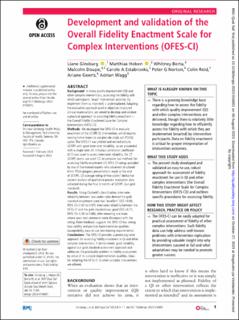| dc.contributor.author | Ginsburg, Liane | |
| dc.contributor.author | Hoben, Matthias | |
| dc.contributor.author | Berta, Whitney | |
| dc.contributor.author | Doupe, Malcolm | |
| dc.contributor.author | Estabrooks, Carole A | |
| dc.contributor.author | Norton, Peter G | |
| dc.contributor.author | Reid, Colin | |
| dc.contributor.author | Geerts, Ariane | |
| dc.contributor.author | Wagg, Adrian | |
| dc.date.accessioned | 2023-11-17T07:31:57Z | |
| dc.date.available | 2023-11-17T07:31:57Z | |
| dc.date.created | 2023-09-22T10:36:10Z | |
| dc.date.issued | 2023 | |
| dc.identifier.citation | BMJ Quality and Safety. 2023, . | en_US |
| dc.identifier.issn | 2044-5415 | |
| dc.identifier.uri | https://hdl.handle.net/11250/3103098 | |
| dc.description.abstract | Background
In many quality improvement (QI) and other complex interventions, assessing the fidelity with which participants ‘enact’ intervention activities (ie, implement them as intended) is underexplored. Adapting the evaluative approach used in objective structured clinical examinations, we aimed to develop and validate a practical approach to assessing fidelity enactment—the Overall Fidelity Enactment Scale for Complex Interventions (OFES-CI).
Methods
We developed the OFES-CI to evaluate enactment of the SCOPE QI intervention, which teaches nursing home teams to use plan-do-study-act (PDSA) cycles. The OFES-CI was piloted and revised early in SCOPE with good inter-rater reliability, so we proceeded with a single rater. An intraclass correlation coefficient (ICC) was used to assess inter-rater reliability. For 27 SCOPE teams, we used ICC to compare two methods for assessing fidelity enactment: (1) OFES-CI ratings provided by one of five trained experts who observed structured 6 min PDSA progress presentations made at the end of SCOPE, (2) average rating of two coders’ deductive content analysis of qualitative process evaluation data collected during the final 3 months of SCOPE (our gold standard).
Results
Using Cicchetti’s classification, inter-rater reliability between two coders who derived the gold standard enactment score was ‘excellent’ (ICC=0.93, 95% CI=0.85 to 0.97). Inter-rater reliability between the OFES-CI and the gold standard was good (ICC=0.71, 95% CI=0.46 to 0.86), after removing one team where open-text comments were discrepant with the rating. Rater feedback suggests the OFES-CI has strong face validity and positive implementation qualities (acceptability, easy to use, low training requirements).
Conclusions
The OFES-CI provides a promising novel approach for assessing fidelity enactment in QI and other complex interventions. It demonstrates good reliability against our gold standard assessment approach and addresses the practicality problem in fidelity assessment by virtue of its suitable implementation qualities. Steps for adapting the OFES-CI to other complex interventions are offered. | en_US |
| dc.language.iso | eng | en_US |
| dc.publisher | BMJ | en_US |
| dc.rights | Navngivelse-Ikkekommersiell 4.0 Internasjonal | * |
| dc.rights.uri | http://creativecommons.org/licenses/by-nc/4.0/deed.no | * |
| dc.title | Development and validation of the Overall Fidelity Enactment Scale for Complex Interventions (OFES-CI) | en_US |
| dc.type | Peer reviewed | en_US |
| dc.type | Journal article | en_US |
| dc.description.version | publishedVersion | en_US |
| dc.rights.holder | © Author(s) (or their employer(s)) 2023 | en_US |
| dc.source.pagenumber | 11 | en_US |
| dc.source.journal | BMJ Quality and Safety | en_US |
| dc.identifier.doi | 10.1136/bmjqs-2023-016001 | |
| dc.identifier.cristin | 2177823 | |
| dc.relation.project | Norges forskningsråd: 188928 | en_US |
| cristin.ispublished | true | |
| cristin.fulltext | original | |
| cristin.qualitycode | 2 | |

